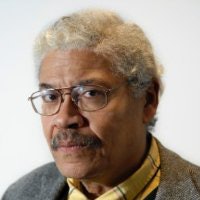There is no clear path to a career in successful science writing. A writing career evolves, just as scientific discoveries do, after endless hours of research and efforts.
Still, focusing on science writing as a journalist in a way that is factual, interesting accurate, and clear to the ordinary reader is becoming increasingly important to more and more people.
 Warren E. Leary
Warren E. LearyIt’s more widespread significance comes in an era marked by heightened emphasis by industry, government and educators on STEM studies, and research and increasing debate among politicians about scientific discoveries and facts.
The journalists considered at the top of their field amid this myriad debate are pulled from their writing tables and labs to be recognized for their work, even if they insist their stories, not them, are what’s important.
Such is the case today for award-winning veteran science writer Warren E. Leary, a low-key Nebraskan noted for his reporting and writing about the nation’s space program and a range of other science topics including sickle cell disease.
Leary is set to be formally inducted Friday into the elite “Chroniclers,” a program at NASA’s historic Kennedy Space Center in Florida that recognizes people who, the Center says, “helped spread the news of America’s space exploration.”
Leary, who has focused on science journalism for more than 40 years, joins a group of six journalists selected earlier this year by a committee of working peers who cover the nation’s space program.
The six, all retired and one deceased, were selected from a group of 20 candidates and boost the ranks of the “Chroniclers” to 72, since the first induction in 1995 by Alan Shepard, the first American in space.
To qualify for consideration, a science journalist would have had to spend at least 10 years writing on the space exploration efforts at the Kennedy Space Center in Florida. Leary, the first Black journalist to be inducted, joins the elite group that includes news legends Walter Cronkite and Jules Bergman.
The panel of judges for Chroniclers’ 2017 inductees found Leary to be “thoughtful, fair, honest and a consummate professional,” says Al Feinberg, a veteran journalist who is a NASA public affairs officer at the Kennedy Space Center.
Leary’s success as a science journalist was not his plan from the start, he says. Upon graduation from high school, his eyes were set on earning a college degree as an aerospace engineer, having gotten the science bug as a child, building backyard rockets and planes.
When his ambitions began hitting a wall and the need to pay his school debts began kicking in, he credits several of his teachers with suggesting he pursue a degree in writing or teaching. With a new agenda, Leary earned a degree from the University of Nebraska.
Soon, he was in the Graduate School of Journalism at Columbia University in the City of New York, where he says his teachers helped solidify his interest and ability to do science reporting and writing.
“I can maintain my interests in science and still do journalism,” he says, recalling how an initially unassociated group of possible options came together to launch him into orbit.
After his Columbia graduation in 1971, Leary started working as a health reporter in 1971 for The Associated Press (AP) Boston bureau. Leary would occasionally be loaned to help his senior colleagues assigned to the Kennedy Space Center. They became his mentors, Leary says, and they were “wonderful.”
By the time Leary left the AP Washington bureau in 1989, he was a well-known science writer, with space exploration reporting in his portfolio. The New York Times hired him to join their science team. During his nearly 20 years as a space science reporter with them, Leary covered space flight, technology, engineering, and medical science.
“My interest in the sciences and aviation was always up there,” Leary says of how his career was, in retrospect, very much a reflection of his childhood interests.
Today, Leary continues to write on occasion, speaks to high school and college students as a lecturer, and serves as a mentor to aspiring science writers. He is active in the National Association of Science Writers.
Leary says college teachers and students should know “it’s (science journalism writing) still worth it,” despite the rising political debate on science issues that run the gamut — climate, ecology, the environment, sickle cell disease, and other health issues.
The scientific debate with “non-facts” has “complicated the water,” says Leary.
Science writers “have to be more careful than before,” he says. “It’s worth diving in. It’s one of the most versatile of beats.”
After a formal inducting program at the Space Center, the brass strips engraved with the name of each Chronicler will be added to a special wall in the Kennedy Space Center newsroom.















